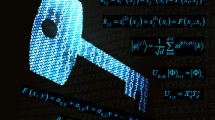Abstract
Ouyang et al. proposed an (n, n) threshold quantum secret sharing scheme, where the number of participants was limited to n = 4k + 1, k ∈ Z+, and the security evaluation of the scheme was carried out accordingly. In this paper, we introduce an (n, n) threshold quantum secret sharing scheme for the number of participants n in any case (n ∈ Z+ ). The scheme is based on a quantum circuit, which consists of Clifford group gates and Toffoli gates. We study the properties of the quantum circuit in this paper and use the quantum circuit to analyze the security of the scheme for dishonest participant attack.






Similar content being viewed by others
References
Bennett, C.H., Brassard, G.: Systems and Signal Processing, vol. 175. IEEE Press, New York (1984)
Ekert, A.K.: Quantum Cryptography Based on bells Theorem. Phys. Rev. Lett. 67, 661 (1991)
Crpeau, C., Gottesman, D., Smith, A.: Secure Multi-party Quantum Computing, The Thiry-Fourth ACM Symposium. ACM, pp. 643–652 (2002)
Broadbent, A., Fitzsimons, J., Kashefi, E.: Universal Blind Quantum Computation, Foundations of Computer Science, pp. 517–526 (2009)
Morimae, T., Fujii, K.: Blind topological measurement-based quantum computation. Nat. Commun. 3, 1036 (2012)
Barz, S., Kashefi, E., Broadbent, A., Fitzsimons, J.F., Zeilinger, A., Walther, P.: Experimental demonstration of blind quantum computing. Science 335, 303 (2012)
Broadbent, A., Fitzsimons, J., Kashefi, E.: Universal blind quantum computation. Found. Comput. Sci. 19, 517–526 (2009)
Aharonov, D., Ben-Or, M., Eban, E.: Interactive proofs for quantum computations. In: Proceedings of Innovations in Computer Science, pp. 453–469 (2017)
Reichardt, B., Unger, F., Vazirani, U.: Classical command of quantum systems. Nat. (Lond.) 496(7446), 456–460 (2013)
Fitzsimons, J.F., Kashefi, E.: Unconditionally verifiable blind quantum computation. Phys. Rev. A 96, 012303 (2017)
Morimae, T.: Verification for measurement-only blind quantum computing. Phys. Rev. A 89, 060302 (2014)
Hayashi, M., Morimae, T.: Verifiable Measurement-Only blind quantum computing with stabilizer testing. Phys. Rev. Lett. 115, 220502 (2015)
Zhou, Z.W., Tu, T., Gong, M., et al.: Progress and Prospect of quantum computing. Prog. Phys. 29, 127–165 (2009)
Ouyang, Y., Tan, S.H., Zhao, L., et al.: Computing on quantum shared secrets. Phys. Rev. A 96, 052333 (2017)
Hillery, M., Buzek, V., Berthiaume, A.: Quantum secret sharing. Phys. Rev. A 59, 1829 (1999)
Bai, C.M., Li, Z. H., Xu, T.T., et al.: A generalized information theoretical model for quantum secret sharing. Int. J. Theor. Phys. 55, 4972–4986 (2016)
Deng, F.G., Gui, L.L., Zhou, H.Y.: An efficient quantum secret sharing scheme with Einstein−Podolsky−Rosen pairs. Phys. Lett. A 340, 43–50 (2006)
Bai, C.M., Li, Z.H., Liu, C.J., et al.: Quantum secret sharing using orthogonal multi-qudit entangled states. Quantum Inf. Process. 16, 304 (2017)
Xiao, L., Long, G.L., Deng, F.G., et al.: Efficient multiparty quantum-secret-sharing schemes. Physics 69, 521–524 (2004)
Xu, T.T., Li, Z.H., Bai, C.M., et al.: A new improving quantum secret sharing scheme. Int. J. Theor. Phys. 56, 1–10 (2017)
Tittel, W, Zbinden, H, Gisin, N.: Experimental demonstration of quantum secret sharing. Phys. Rev. A 63, 42301 (2001)
Bai, C.M., Li, Z.H., Xu, T.T., et al.: Quantum secret sharing using the d-dimensional GHZ state. Quantum Inf Process 16, 59 (2017)
Cleve, R., Gottesman, D., Lo, H.-K.: How to share a quantum secret. Phys. Rev. Lett. 83, 648 (1999)
Gottesman, D.: Theory of quantum secret sharing. Phys. Rev. A 61(4), 192–193 (2000)
Markham, D., Sanders, B.C.: Graph states for quantum secret sharing. Phys. Rev. A 78, 042309 (2008)
Deutsch, D., Barenco, A., Ekert, A.: Universality in quantum computation. Proc. Math. Phys. Sci. 449(1937), 669–677 (1995)
Zhou, X., Leung, D.W., Chuang, I.L.: Methodology for quantum logic gate constructions. Phys. Rev. A 62, 052316 (2000)
Author information
Authors and Affiliations
Corresponding author
Rights and permissions
About this article
Cite this article
Bai, HY., Li, ZH. & Hao, N. Quantum Security Computation on Shared Secrets. Int J Theor Phys 58, 10–21 (2019). https://doi.org/10.1007/s10773-018-3905-1
Received:
Accepted:
Published:
Issue Date:
DOI: https://doi.org/10.1007/s10773-018-3905-1




